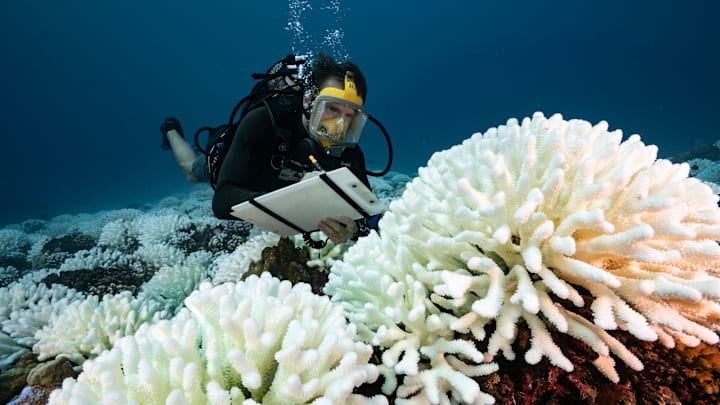The Vital Role of Oceans in Earth's Ecosystems

Oceans cover more than 70% of the Earth's surface and are vital to the planet's ecosystems, climate, and human life. These vast bodies of saltwater are home to an incredible diversity of life forms and play a critical role in regulating the Earth's climate, supporting biodiversity, and providing numerous resources and services to human societies. Understanding the vital role of oceans in Earth's ecosystems is essential for promoting their conservation and sustainable use.
Oceans are the largest carbon sink on the planet, absorbing approximately 25% of the carbon dioxide (CO2) emitted by human activities each year. This process helps to mitigate the impacts of climate change by reducing the concentration of greenhouse gases in the atmosphere. Marine organisms, such as phytoplankton, play a crucial role in this carbon sequestration process through photosynthesis, converting CO2 into organic matter and releasing oxygen. The carbon captured by phytoplankton is transferred through the marine food web and eventually stored in ocean sediments.
In addition to carbon sequestration, oceans regulate the Earth's climate by absorbing, storing, and redistributing heat. The ocean's ability to absorb and release heat helps to moderate global temperatures and influence weather patterns. Ocean currents, such as the Gulf Stream and the Antarctic Circumpolar Current, transport warm and cold water around the globe, affecting regional climates and ecosystems. The interaction between the ocean and the atmosphere also drives the water cycle, influencing precipitation patterns and weather systems.
Oceans are biodiversity hotspots, supporting a vast array of marine species and habitats. Coral reefs, mangroves, seagrass beds, and deep-sea ecosystems are among the most productive and diverse environments on Earth. These habitats provide critical services, such as nutrient cycling, habitat provision, and shoreline protection, that support the health and stability of marine and coastal ecosystems. Marine biodiversity also underpins the productivity and resilience of fisheries, which are vital for global food security and livelihoods.
Human societies rely heavily on the resources and services provided by oceans. Fisheries and aquaculture supply protein and essential nutrients to billions of people worldwide, supporting food security and economic development. Oceans also provide raw materials, such as oil, gas, minerals, and renewable energy resources, such as wind and wave power. Coastal and marine ecosystems support tourism and recreation, generating significant economic revenue and promoting cultural and spiritual connections to the ocean.
Despite their importance, oceans face significant threats from human activities and environmental pressures. Overfishing, pollution, habitat destruction, climate change, and ocean acidification are leading to the degradation of marine ecosystems and the decline of marine biodiversity. Overfishing depletes fish populations, disrupts food webs, and damages habitats, while pollution from plastic waste, chemicals, and nutrients contaminates marine environments and harms wildlife. Climate change and ocean acidification, driven by increased CO2 levels, affect the health and resilience of marine ecosystems, leading to coral bleaching, changes in species distribution, and disruptions to marine food webs.
Efforts to conserve and sustainably manage oceans are essential for ensuring their continued provision of benefits and services. Protecting marine habitats through the establishment of marine protected areas (MPAs), community conservation initiatives, and legal frameworks is a critical strategy. Sustainable fisheries management, including the enforcement of fishing quotas, the protection of spawning areas, and the reduction of bycatch, can help maintain healthy fish populations and ecosystems. Reducing pollution through improved waste management, stricter regulations, and public awareness campaigns is also crucial for protecting marine environments.
Engaging local communities and stakeholders in ocean conservation is vital for the success of these efforts. Recognizing the rights, knowledge, and needs of coastal and indigenous communities ensures that conservation initiatives are socially inclusive and culturally appropriate. Community-based management approaches can empower local people to take an active role in protecting and sustainably using ocean resources. Education and awareness campaigns can foster a greater appreciation of oceans and encourage sustainable behaviors.
International cooperation and policies play a crucial role in addressing the global challenges facing oceans. Initiatives such as the United Nations' Sustainable Development Goals, the Convention on Biological Diversity, and the Paris Agreement provide a framework for coordinated action to protect and restore oceans. Financial incentives, such as payment for ecosystem services and blue carbon initiatives, can support ocean conservation and restoration efforts.
In conclusion, oceans are vital to Earth's ecosystems, climate, and human life. Their role in carbon sequestration, climate regulation, biodiversity support, and resource provision underscores their ecological and economic importance. However, oceans face significant threats from human activities and environmental pressures. Conserving and sustainably managing oceans is essential for ensuring their continued provision of ecosystem services and benefits. By recognizing the value of oceans and taking concerted action to protect them, we can preserve these vital ecosystems for the benefit of present and future generations.